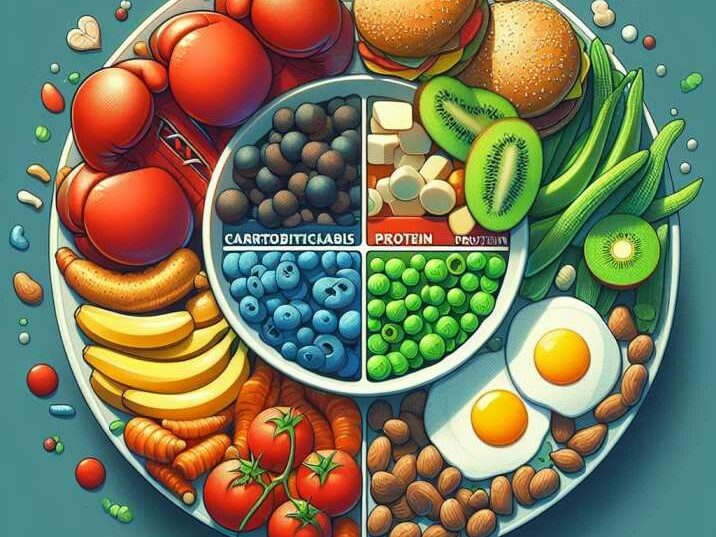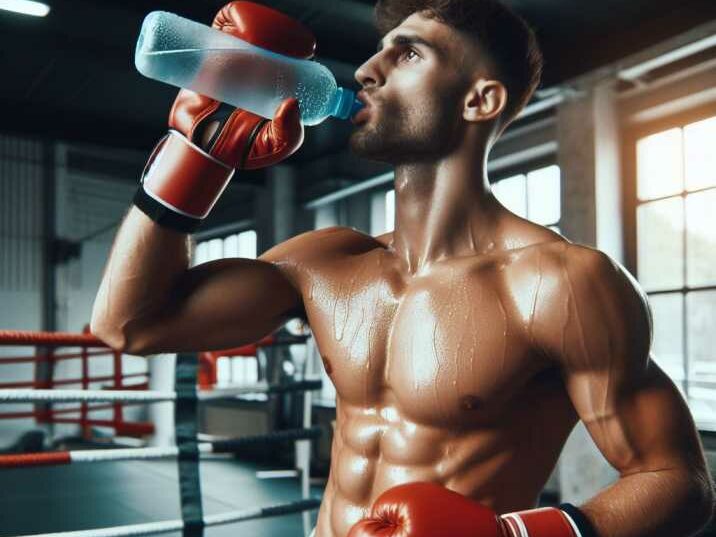Introduction:
Table of Contents
Boxing is a physically demanding sport that requires athletes to be in peak condition both mentally and physically. While training and technique play crucial roles in a boxer’s performance, nutrition is often underestimated. Proper Boxing nutrition can significantly impact a boxer’s stamina, strength, endurance, and overall performance in the ring. In this comprehensive guide, we’ll explore the importance of boxing nutrition and provide valuable insights on how to fuel your body for optimal performance.

1. Understanding the Role of Nutrition in Boxing Performance:
Boxing is a sport that demands peak physical and mental performance. From intense training sessions to grueling fights, boxers push their bodies to the limit. Nutrition serves as the fuel that powers these endeavors, providing the energy and nutrients needed for strength, endurance, and recovery. By understanding the pivotal role of nutrition in boxing, athletes can optimize their diets to support their training and performance goals.
Importance of Carbohydrates:
Carbohydrates are the body’s primary source of energy, making them essential for boxers. Complex carbohydrates, found in foods like whole grains, fruits, and vegetables, provide a steady and sustained release of energy, crucial for maintaining endurance during long training sessions and fights. By prioritizing complex carbs in their diet, boxers can ensure they have the fuel they need to perform at their best.
Role of Proteins in Muscle Repair and Growth:
Protein is the building block of muscle and plays a vital role in repair and recovery. For boxers, who subject their bodies to intense physical exertion, adequate protein intake is crucial for supporting muscle growth and repair. Lean protein sources such as chicken, fish, and tofu should be incorporated into every meal to ensure optimal recovery and performance.
Incorporating Healthy Fats:
Despite their bad reputation, fats are an essential part of a boxer’s diet. Healthy fats, such as those found in avocados, nuts, and olive oil, provide long-lasting energy and support hormone production and brain function. By including healthy fats in their diet, boxers can maintain energy levels, improve cognitive function, and support overall health and well-being.
2. Preparing Your Body for Training and Competition:
Proper nutrition before training and competition is critical for maximizing performance and preventing fatigue. Pre-workout meals should be rich in carbohydrates, moderate in protein, and low in fat to provide a readily available energy source without causing digestive discomfort.
Timing Your Pre-Workout Meals:
Ideally, pre-workout meals should be consumed 1-3 hours before training or competition to allow for proper digestion and absorption of nutrients. Snacks high in carbohydrates and moderate in protein, such as banana with peanut butter or yogurt with granola, can be consumed 30-60 minutes before exercise for a quick energy boost.
Hydration for Optimal Performance:
Proper hydration is crucial for boxing performance. Dehydration can lead to fatigue, cramping, and decreased mental clarity, all of which can hinder performance in the ring. Boxers should aim to stay hydrated throughout the day and during training sessions, paying special attention to electrolyte balance to support muscle function and hydration levels.

3. Recovering and Replenishing Post-Workout:
After intense training sessions or fights, proper post-workout nutrition is essential for muscle recovery, glycogen replenishment, and overall recovery. Consuming a combination of carbohydrates and proteins within 30 minutes to an hour after exercise can enhance recovery and promote muscle growth.
Importance of Protein for Muscle Repair:
Protein-rich foods or supplements consumed post-workout provide the necessary amino acids for muscle repair and growth. Whey protein shakes, Greek yogurt, and chocolate milk are popular options for post-workout protein sources.
Replenishing Glycogen Stores with Carbohydrates:
Carbohydrates play a crucial role in replenishing glycogen stores depleted during exercise. Consuming complex carbohydrates such as sweet potatoes, quinoa, or whole grain pasta post-workout can help restore energy levels and support recovery.
Table of Information Role in Boxing Nutrition:
| Nutrient | Role in Boxing Nutrition | Food Sources |
|---|---|---|
| Carbohydrates | Primary source of energy; sustain energy levels | Whole grains, fruits, vegetables |
| Protein | Muscle repair and growth; support recovery | Chicken, fish, eggs, legumes |
| Healthy Fats | Hormone production; brain function | Avocados, nuts, seeds, olive oil |
| Electrolytes | Rehydration; muscle function | Sports drinks, bananas, leafy greens |
Conclusion:
In conclusion, Boxing nutrition plays a vital role in maximizing boxing performance. By fueling your body with the right nutrients at the right times, you can enhance stamina, strength, endurance, and overall athletic performance in the ring. Remember to prioritize carbohydrates, proteins, healthy fats, and hydration to optimize your training, recovery, and competitive edge as a boxer.
FAQs:
- What should I eat before a boxing match?
- Answer: Prioritize carbohydrates for sustained energy and include a moderate amount of protein for muscle support. Avoid foods high in fat or fiber to prevent digestive discomfort during the match.
- Is hydration important for boxing performance?
- Answer: Yes, staying hydrated is crucial for optimal cognitive function, reaction time, and endurance during training and competition.
- How soon should I eat after a boxing workout?
- Answer: Aim to consume a combination of carbohydrates and proteins within 30 minutes to an hour after exercise to support muscle recovery and replenish glycogen stores.
- Can supplements enhance boxing performance?
- Answer: While supplements can complement a well-rounded nutrition plan, it’s essential to prioritize whole foods for optimal nutrient intake.
- Are there specific foods that can improve boxing endurance?
- Answer: Foods rich in complex carbohydrates, such as whole grains, fruits, and vegetables, can provide sustained energy levels and improve endurance during training and competition.


